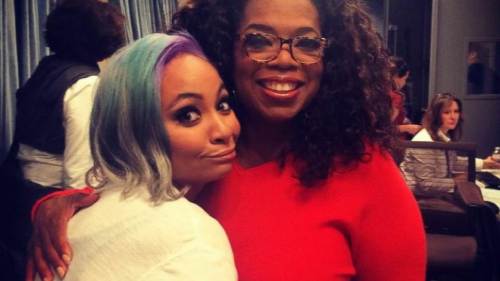“Oh, girl. Don’t set up Twitter on fire. Oh, my lord. What did you just say?”
Did you see Oprah’s face as she muttered those words and readjusted herself in her seat? Classic. Classic, I say! Her reaction was spawned from Raven-Symone’s musing that she was tired of being labelled “African-American”, because she is an American: full stop.
I didn’t monitor Black Twitter for its response to Raven’s exclamations. There is nothing revolutionary about what she said. Frederick Douglass himself said something similar some 200 years ago when he looked into the future and proclaimed that through the magic of miscegenation, Americans would neither be primarily Black nor White, but would look more “like the Phoenicians”. (Who I gather from his description were bronzy, mixed race folk. You know, kinda like Raven.)
Of course we know 200 years on he was wrong. There are still very sharp class and color divisions in this country, but I doubt that Mr. Douglass could have foreseen and accounted for the hundreds of thousands of Africans who willingly migrate to these shores in the last 60 years and bolster the black count, thereby holding his fantasy “colorless society” at bay.
It’s not that Raven-Symone is wrong about how she identifies (or doesn’t identify) herself…it’s just that she isn’t right. More precisely, her views are not right for this time. This is America, circa 2014. Our census forms do not simply ask “if you’re an American”. They require you to tick one or more boxes to identify a race. They ask you to divulge how much money you earn per annum. They ask you your zip code. All these things are meant to categorize a human being in order to determine what type of American one is, and in Raven-Symone’s case, that would be a wealthy octoroon female. The only place an American’s race doesn’t matter is outside of America.
I’m sure I’ve told you all this story before. Last year when I was travelling to Ghana, I met a man while I was in transit in Frankfurt. He was from Detroit and we spent 4 hours of our layover chatting and roaming through the airport. We found ourselves in front of a stall that sold pastries and juice, people watching and commenting on what we saw. A white woman approached us with a mixture of perplexity and relief on her face.
Interrupting our conversation, she gushed “It’s SO good to hear American!”
We stood there looking at her – my Black male companion and I – waiting for her to expound on her statement, but she nodded, smiled and pranced off. Would she have approached us in Piedmont Park and told us how good it was to “hear American?” Doubtful. But we were obviously acceptable Negros who could afford airfare to a foreign country, which made us just Americans. The dynamics and interactions change when one is no longer on US soil, and that’s just the gospel.
Raven-Symone is not like the rest of us. Raven-Symone is famous and has made more money in her short life than 89% of the population. She can afford to be eccentric and define herself as “colorless”. Access to wealth and privilege allows her to navigate life in America in a way that many people of color can and do not. Poor and marginalized folk cannot afford such esotericism. That sort of independent thinking doesn’t translate well in our shift work, minimum wage paying society…the worker ant foundations of which allow people like Raven-Symone identify as just a (colorless) human being who loves (female) human beings.
My husband thinks that Raven-Symone is actually right: she should be able to identify as just human. However where her sexuality/love life is involved, he sees her definition as problematic.
“You just can’t say you’re a human being who loves other humans,” he said. “That opens the door for all kinds of other things.”
“Like saying you love your dad because he’s a strong male who provides?”
Eww. Let me not even finish that thought! You know where I’m heading. Basically, there need to be some better parameters around the category of human being we’re loving. Unfettered free love can lead to unruly chromosomes.
Selah.
Self-identification is a huge deal, because the world is changing. Humanity is going through yet another shift. How we approach it could lead us to utopia or through another turn through the Dark Ages. Is there any such thing as a “colorless” human being? Should there be?”
